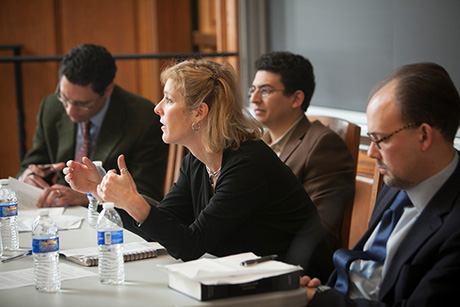Drones hide suffering of war, panelists say
By Owen Lubozynski

The Obama administration’s security policy isn’t necessarily less coercive than that of George W. Bush, it’s just much more proceduralized, said Aziz Rana, associate professor of law at Cornell Law School March 25 as part of a panel, “The Next Four Years in Counterterrorism Policy.”
The administration’s security policy cultivates a global detention system that subcontracts much of the work to allies. “Even if what we have now is much more proceduralized,” he said, “that doesn’t mean it’s going to be significantly less coercive than Bush-era practices that were ad-hoc and discretionary.”
Focusing on domestic detention and prosecution, panelist Wadie Said of the University of South Carolina addressed the federal prosecution of terror suspects and the use of informants, which has trickled down to the local level.
“When challenged, senior law enforcement officials – starting from Attorney General [Eric] Holder to FBI Director [Robert] Mueller to NYPD Chief Raymond Kelly – say, ‘look, this is an invaluable tactic that we must use, and we’re going to stick to it even at the costs of marginalizing, alienating and criminalizing a whole community,’” he said.
Jens Ohlin, associate professor of law, addressed the “privilege of combatancy,” which licenses combatants to kill enemy soldiers, and questioned whether and how drones or their operators could qualify. He also discussed the recent proposal of a “drone court,” to oversee strikes. Such a body, he argued, could create a “system of perverse incentives” for the administration, deterring it from targeting killings of prominent individuals and toward “signature strikes” aimed at groups believed to be militants but without confirmed identities.
Sarah Kreps, Cornell assistant professor of government, examined drone policy as a tool for shielding the public from the costs of war and thus removing incentives to demand peace. “When wars can be fought without young men and women going into battle to kill and be killed, governments don’t have to offer justifications for what they’re doing,” she observed. “This insulation from the costs and consequences will mean that leaders won’t have to obtain popular permission to go to war.”
“If anything,” said Chantal Thomas, professor of law and director of the Clarke Initiative for Law and Development in the Middle East and North Africa, which organized the panel, “the drones are announcing to us that we’ve officially broken whatever boundary might have existed previously between law and war, between peacetime and wartime.”
Owen Lubozynski is a freelance writer for the Law School.
Media Contact
Get Cornell news delivered right to your inbox.
Subscribe